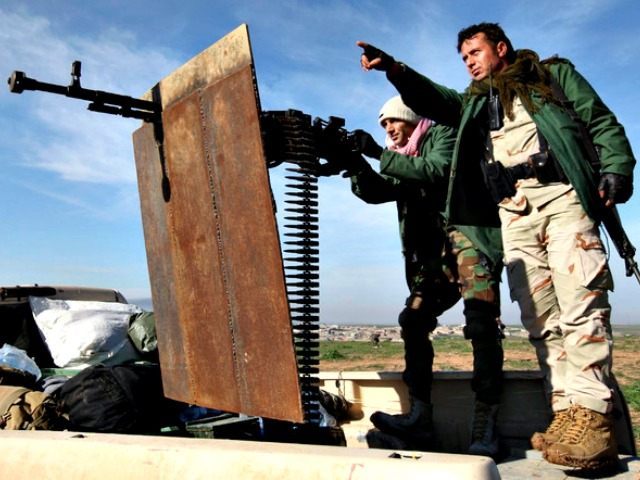Kurdish Peshmerga forces in Iraq report this week that they have made significant gains against ISIS near Kirkuk, a northern oil city about an hour and a half south of the Kurdish capital of Erbil. This news follows reports that ISIS leader Abu Bakr al-Baghdadi has fled northern Mosul south to Ramadi.
“In today’s assault against ISIS-held villages in western Kirkuk we managed to recapture 12 villages so far and we had planned to reclaim 19 villages. Clashes are still underway and the Peshmerga are advancing to recapture the remaining villages,” Mohammed Haji Mahmoud, a spokesman for the Kurdish government, told news outlet Rudaw. He confirmed to the outlet that Peshmerga forces– which operate independently of the Iraqi government in Baghdad, have found a number of land mines and traps set in areas previously held by the Islamic State, and that they appear to be losing their control of the region.
Reuters reports that another assault on Kirkuk began in the early dawn hours of September 30 and has placed the Peshmerga in a strategic position to attack Hawijah, the Islamic State center in the Kirkuk region.
These on-the-ground reports follow news of advances aided by attacks by coalition forces in the air. Rudaw notes that, in Mosul, north of Kirkuk, airstrikes killed “at least 15” Islamic State terrorists. “The airstrikes shelled Daesh [ISIS] bases in Sheikh Fathi neighborhood, in the west of Mosul, completely destroying their base and killed 15 gunmen,” a spokesman said. Snipers reportedly also killed a number of ISIS terrorists in the outskirts of Mosul on Tuesday.
Mosul is considered the Islamic State’s de facto capital in Iraq. It is the second-largest city in Iraq, and has been under Islamic State control since June 2014. At the time, ISIS cleaned the city of Christians by confiscating their property and offering three options: flight, death, or conversion and payment of an “infidel” tax.
These attacks follow the news that ISIS leader Abu Bakr al-Baghdadi may have left Mosul. He has been reportedly living there since the capture of the city, and his departure may be an indication that ISIS may no longer feel the city is safe from attack. London-based Asharq Al-Awsat published the report, which claims al-Baghdadi has relocated to Ramadi, several hundred miles south. Such a move would also relocate the base of ISIS’s high-level operations, though its largest city remains Raqqa, Syria. The report also calls into question claims that al-Baghdadi had been severely wounded, as he would not be able to travel such a distance if those reports were true. Ramadi remains under ISIS control.
The focus of the fight against the Islamic State has largely moved to Syria in the past week, and especially today following reports that Russia has begun conducting airstrikes on strongholds of opposition to head of state Bashar al-Assad. Russia has also been active in Iraq, however, cementing a deal with the Iraqi government in Baghdad, as well as Iran and Syria, to share intelligence related to the Islamic State’s positions across the region. “Like Russia’s earlier move to bolster the government of President Bashar al-Assad by deploying warplanes and tanks to a base near Latakia, Syria, the intelligence-sharing arrangement was sealed without notice to the United States,” The New York Times reported.

COMMENTS
Please let us know if you're having issues with commenting.